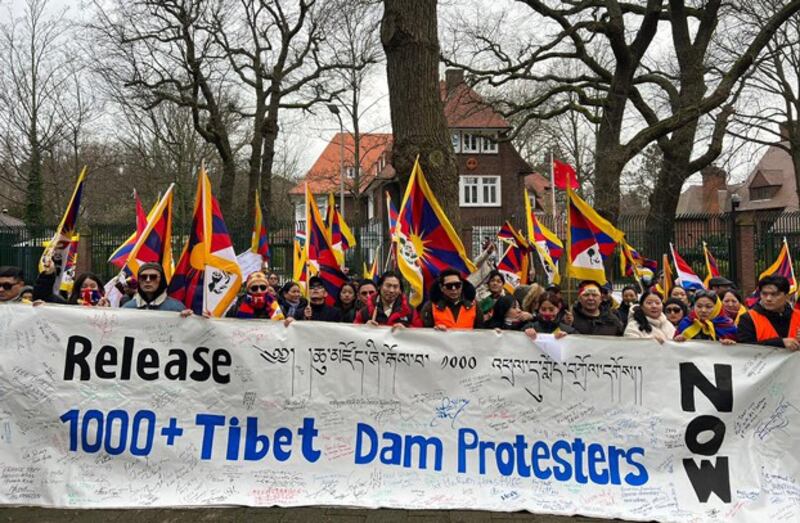Chinese officials have told local ethnic Tibetans and monastic leaders in Sichuan province to maintain stability following the arrest of more than 1,000 protesters over a hydropower dam, and made clear that the project would continue, two Tibetans with knowledge of the situation said.
If built, the Gangtuo Dam power station on the Drichu River could submerge several monasteries in Dege's county's Wangbuding township and force residents of at least two villages near the river to relocate, sources earlier told RFA.
“Chinese officials have held meetings in the Wonto village area where they ordered local Tibetans to comply with the government’s plans and regulations and called for the leaders of the local monasteries to mobilize the locals to toe the party line,” said one source who hails from Dege and now lives in exile.
On Feb. 25, Dege County Party Secretary Baima Zhaxi visited Wangbuding and neighboring townships to meet with Buddhist monastic leaders and village administrators, during which he called for "stability" and urged residents to comply with regulations or else be "dealt with in accordance with the law and regulations," according to a local news report.
“As the stability maintenance period in March and the national Two Sessions approach, we must implement detailed stability maintenance measures to promote continued harmony and stability in the jurisdiction,” Zhaxi was quoted in the report as saying.
The Two Sessions refers to China's annual meetings of the National People's Congress and of the Chinese People's Political Consultative Conference, being held this week in Beijing.
“We must continue to carry out the investigation and resolution of conflicts, risks and hidden dangers, and effectively resolve conflicts and disputes at the grassroots level, and nip them in the bud,” Zhaxi said.
Zhaxi’s visit comes ahead of Tibetan Uprising Day on March 10, a politically sensitive date that commemorates the thousands of Tibetans who died in a 1959 uprising against China’s invasion and occupation of their homeland, and the flight of their spiritual leader, the Dalai Lama, into exile in northern India.
Keep building
Zhaxi also visited the dam construction site and told the leaders of the coordination team to adhere to their work orders and make arrangements for "the next step of work," according to a local Chinese government announcement.
Zhaxi told residents about “the great significance and necessity of the construction of hydropower stations” and indicated that the government would “protect the legitimate interests of the masses to the greatest extent.”
“Abide by the law, express your demands in a legal, civilized and rational manner, and do not exceed the bottom line,” Zhaxi told locals during the on-site visit, according to the same news report. “Otherwise, you will be dealt with in accordance with the law and regulations.”

On Feb. 23, police arrested more than 1,000 Tibetans, including monks and residents in the county in Sichuan's Kardze Autonomous Tibetan Prefecture, who had been protesting the construction of the dam, meant to generate electricity.
Authorities continue to heighten security restrictions in Dege county on the east bank of the Drichu River, called Jinsha in Chinese, and in Jomda county of Chamdo city in the Tibet Autonomous Region on the west bank of the river, said the sources who both live in exile and requested anonymity for safety reasons.
Strict surveillance
Residents are forbidden from contacting anyone outside the area, the sources said. Chinese officials continue to impose strict digital surveillance and tight restrictions on movement in Wangbuding after rare video footage emerged from inside Tibet on Feb. 22 of Chinese police beating Tibetan monks, before arresting more than 100 of them, most of whom were from Wonto and Yena monasteries.
Since then, authorities have carried out wide-scale rigorous interrogations of the arrested Tibetans, even as information from inside Tibet has been harder to come by amid a crackdown on the use of mobile phones and social media and messaging platforms to restrict communication with the outside world, sources said.
The protests began on Feb. 14, when at least 300 Tibetans gathered outside Dege County Town Hall to protest the building of the Gangtuo Dam, part of a massive 13-tier hydropower complex with a total planned capacity of 13,920 megawatts.
Over the past two weeks, Tibetans in exile have been holding solidarity rallies in cities in the United States, Canada, France, the Netherlands, Switzerland, the United Kingdom, Australia and India.
Global leaders and Tibetan advocacy groups have condemned China's actions, calling for the immediate release of those detained.Last week, Chinese authorities released about 40 of the arrested monks on Feb. 26 and 27, RFA reported.
Additional reporting and editing by Tenzin Pema for RFA Tibetan. Edited by Roseanne Gerin and Malcolm Foster.
